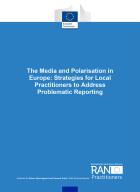Details
- Publication date
- 31 May 2023 (Last updated on: 26 June 2024)
- Author
- Directorate-General for Migration and Home Affairs
- RAN Publications Topic
- (Early) prevention
- Alternative and counter narratives
- Counter- and alternative narratives
- Internet and radicalisation
- Local strategies/cities
- Lone actors
- Social cohesion and polarisation
Description
The media, or news media, includes both “traditional media” – print, radio and television – and “new media” published online through webpages, mobile apps and social media. Whatever the form, the media is a critical part of the information environment, largely responsible for framing political and social issues and informing the public about key events, often shaping their understanding of key issues in the process.
Therefore, where someone gets their information can significantly impact their understanding of events and their perception of their society. The media wields a great deal of influence, so as the media landscape becomes more fractured and disinformation more pervasive, there is a critical need to examine the role that the media may be playing in furthering polarisation, populism and extremism in Europe, and to consider what policymakers and practitioners can do about it.
Polarisation can be defined as a divergence of opinions to opposing ideological extremes, which can be discussed as both a state of being and a process over time. It may also be understood as a behaviour, describing how members of a group converge around a specific action such as watching a particular news channel. Polarisation leads people to approach complex social issues in “black and white” terms, and they contrast and clash sharply with those holding views different from their own. These clashes are different from and should not be confused with regular disagreements where people bring forward and advocate different points of view.
Discourse on important issues is beneficial; however, the “othering” of groups that hold opposing views (a trend often seen in polarised settings) hinders meaningful debate in a democratic setting. Polarisation sows stark divisions within society that can – although do not always – provide an enabling environment for the rise of extremist ideologies and movements. Extremism feeds on polarisation because it seeks to propagate a system of beliefs based on superiority and a struggle between an identity-based “in-group” over an “out-group”, framed as “us versus them”.
In this struggle, the “other” is frequently dehumanised; this is coupled with condescending and hate-filled views and actions. Many people subscribing to extremist ideologies do not endorse the use of violence. Those that do, however, pose an immediate threat to the security and safety of communities, while those who don’t can contribute to the further fracturing of social cohesion. So, while polarisation and (violent) extremism are separate phenomena, they are linked, and thus addressing polarisation should be a priority for practitioners working to improve security and re-affirm respect for human rights and democratic values.

